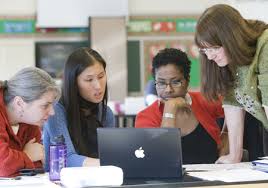So, New BCED Plan Means What and How?
Every BC school will be working on creating frameworks and unit plans that incorporate the new BCED Plan in the next few months and my school is no exception. However, how will we do it and how far and fast should we go? As a small school, I do feel that we can move faster than other larger schools in both incorporating and assessing our implementation of the new curriculum, but I also feel the push back and the growing pains. One thing I will say, though, is that there is so much potential for good learning in the new curriculum that it is dizzying. However, there are many teachers who don't like that the new curriculum leaves teachers with many questions as to how to implement it. I will let you in on a little secret about myself here: in my opinion, as the questions are an important part of the curriculum itself (as Erno Rubik said, we have been teaching answers in education for years, but it is questions that are probably more important: See Video), am good with that. In fact, I applaud it. |
In essence, teaching has been about keeping 15-30 kids in line in a classroom while knowledge is shared to them, after which that knowledge is asked to be shown to the teacher (and all of us) via some form of written test (since that was the quickest and easiest way to assess students a the time). This direction existed because of various reasons, including the fact that the teachers and the textbooks were the keeper of the knowledge, and also that the knowledge required to be seen as well-educated was arguably the same for everyone (to prepare students for the jobs of the times). Both of these aspects have now changed. Since the late 1990's, jobs have changed within the span of decades (with newer ones in newer industries being added every few years). This means that you cannot assess preparedness for society or the workplace based on knowing the skills needed for a specific job or industry. Secondly, we live in the digital age where information is easy to find; this means that the teacher and the textbooks are no longer the holders of the knowledge. Thus, to stand in front of a classroom and tell students what they should know about a topic is not a good use of educational time.
Instead, I believe that what teachers will need to do to get ready for the changes is to do what we are asking our students to do: collaborate, think critically, and be socially and personally responsible (for
 teachers, this means fulfilling the mandates of a professional educator). Specifically, I believe teachers will now need to learn about how students learn (and understanding that they don't all learn the same way or at the same time), assess skills that are not content based (but instead looking at the skills needed to do any job in any industry), work together to share teaching and assessment strategies (instead of being the "God of the classroom"), and finally take professional development on as a necessity for the job (and not an administratively mandated chore).
teachers, this means fulfilling the mandates of a professional educator). Specifically, I believe teachers will now need to learn about how students learn (and understanding that they don't all learn the same way or at the same time), assess skills that are not content based (but instead looking at the skills needed to do any job in any industry), work together to share teaching and assessment strategies (instead of being the "God of the classroom"), and finally take professional development on as a necessity for the job (and not an administratively mandated chore).This does not take the administrators off the hook by any means, however, as I believe that for teachers to be successful there needs to be an administrative team that is supportive, vibrant, and able to assist in the transition with a plan consisting of focused support. This will take work and a lot of communication (something that is easy to say but harder to do). Also, it will mean risk taking and a critical look at certain framework concepts, such as schedule, staff, course options, and pro-d opportunities. These take time, money, and effort to implement, and also include some hard choices, but I believe it must be done if we are to take our schools into a new direction.
Let me conclude by using the image of a school bus as a metaphor for the school (thanks Jim Collins): we need to get the right people on the bus, and then get drivers who will drive it in the right direction, keeping an eye out for potholes and detours. This is what education means now, and the what will impact the how (as it has always done).

No comments:
Post a Comment